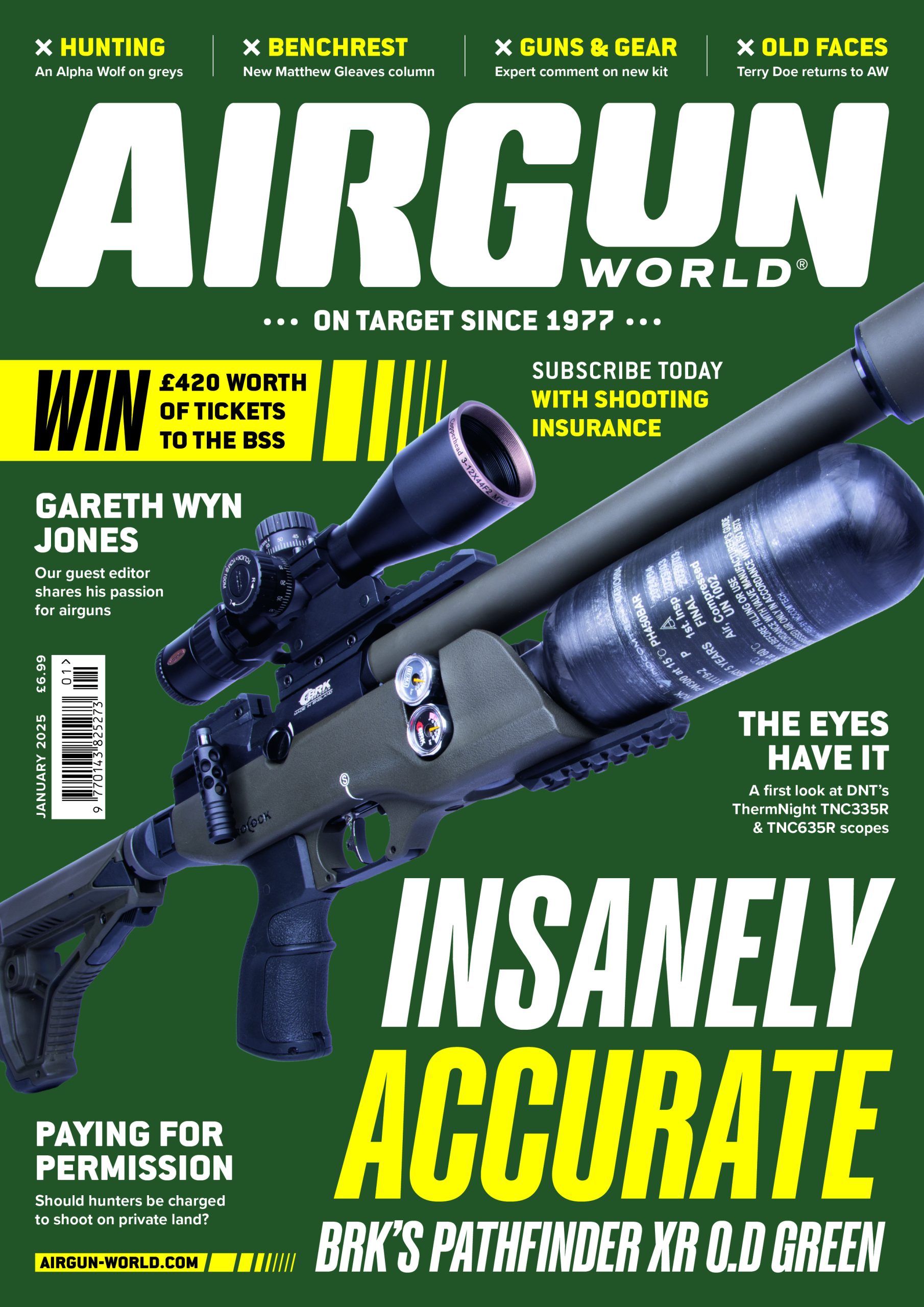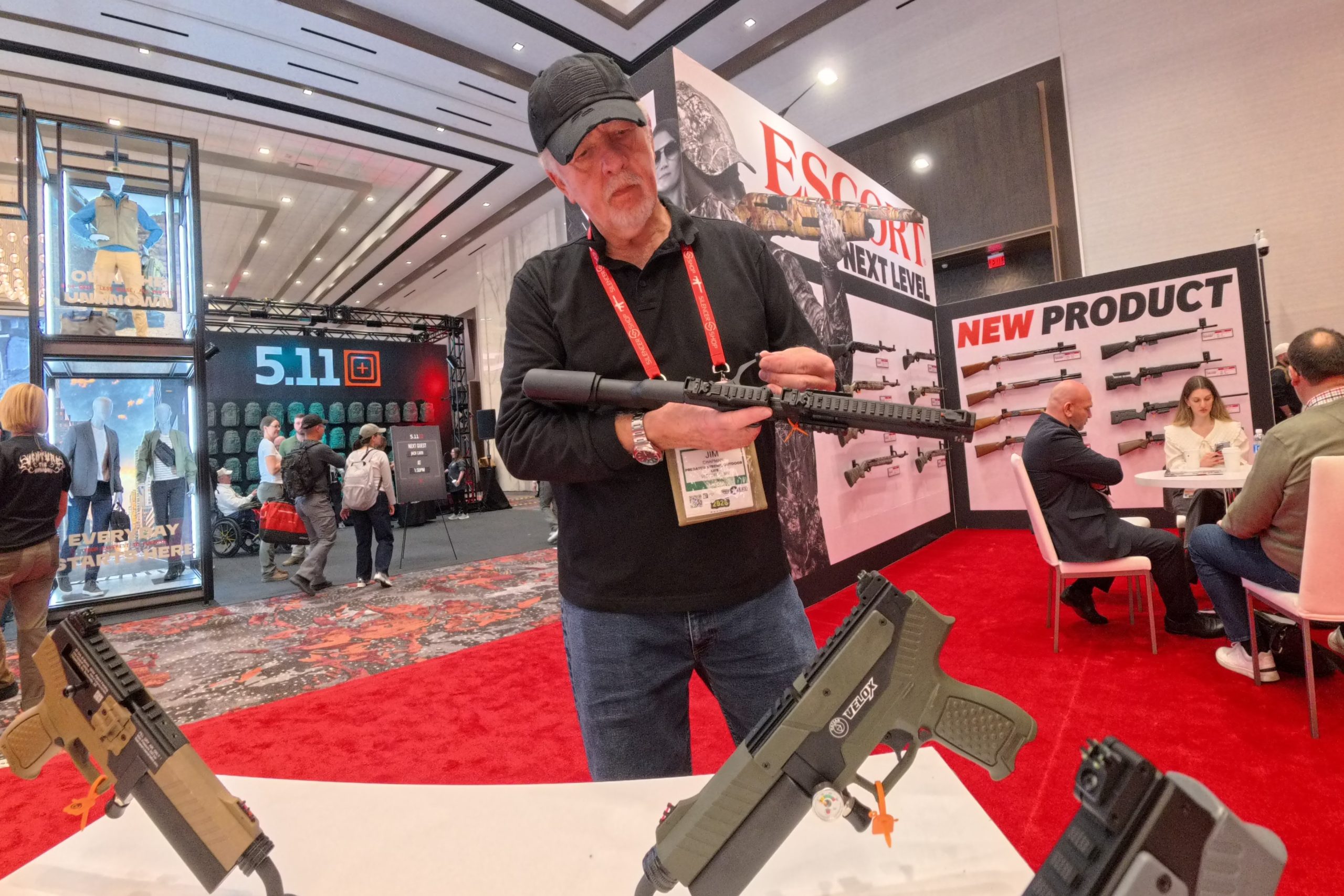The countdown is on for The British Shooting Show – book tickets online today and save on gate price!
The physical and mental health benefits of airgun shooting
Darren Myatt's physical and mental health suffered unimaginable blows following the death of five close family members in quick succession. He shares how airgun shooting, being out in the countryside and a new fitness regime have all put him on the road to recovery

In the stillness of a rural afternoon, Darren Myatt can be found shouldering his HW100 bullpup, scanning the trees for movement. For him, the silence is broken only by birdsong and the rustle of a gentle breeze across the grass. It is peaceful here, therapeutic even. But not long ago, Darren and his mental health stood in a very different place, battling grief, isolation and the quiet onset of abject despair.
“I’d always been someone who just breezed through life,” he says. “I loved a laugh, loved my dogs, loved being out with my airgun. But after everything that happened…I just lost all interest. Everything.”
What “happened” was a devastating succession of personal losses which began in late 2023. Within the space of five months, Darren lost five close relatives: his aunt died just before Christmas, followed by his uncle in early January, his mother in March and then two cousins in quick succession. Each passing was a massive blow to Darren and his family, but it was the death of his mother, Kay, that affected his mental health the most.
“I’d already lost my father 13 years earlier,” he explains, “but when my mother died, that was it. Something just shut down inside me. I was completely lost and didn’t know what to do.”
Feelings, symptoms, grief and recovery
Like many who suffer with Darren withdrew into himself. He stopped walking the dogs. He stopped calling friends. He stopped smiling. He began drinking more than usual, not to excess, but enough to dull the sharp corners of his grief. Even the pastimes he’d once found joy in, including pest control outings on the local farm, Sunday mornings with his air rifle and quiet evenings by the river with a fishing rod held no appeal.
“I just couldn’t be bothered anymore,” he says. “Didn’t want to go out, didn’t want to talk. I didn’t want to be around people. And the more I pulled away, the worse I felt.”
The turning point came not from within, but from the person closest to him. His wife, Kate, had watched the changes take hold, feeling increasingly helpless. One day, she stepped in.
“She’s a wonderful woman,” Darren says, his voice softening. “She couldn’t take it anymore. She booked me in to see my GP herself and even came with me to make sure I went. I didn’t want to go, but I couldn’t say no to her, could I?”
It was a pivotal moment in Darren’s future. Blood tests revealed his cholesterol levels were alarmingly high — three times the recommended limit, in fact. For someone whose own father had died of a heart attack at 66, it was a wake-up call he simply couldn’t ignore.
“I was on holiday in Devon when the GP rang me,” Darren recalls. “We were in the middle of a break we should’ve been enjoying, but that phone call hit me hard. I just looked at Kate and said, “That’s it. Things have to change when we get home.”
Changes to diet and mountain bike riding
And so Darren began to change, slowly at first, but with growing determination. He overhauled his diet, cutting out the foodstuffs that had become a comfort during the months of mourning. He bought a mountain bike, a Carrera, despite not having ridden one since childhood, and began cycling regularly.
“I hadn’t been on a bike in years,” he says, “but I took to it straight away. It gave me a goal, something to build into my week.”
The benefits came quickly. The weight began to fall away. Darren, who had once tipped the scales at more than 15 stone, found himself dropping down to 12 stone within months. He was sleeping better. He had more energy. His mood lifted.
But there was still something missing — something beyond fitness and diet. What brought Darren fully back to life was his return to the world he had once found so grounding: the quiet focus of airgun shooting. Specifically, it was the acquisition of a rifle he had long admired: the Weihrauch HW100 bullpup.
“I’d had my eye on that rifle since it first came out,” he says. “It’s a lovely piece of kit — well balanced, smooth to shoot, really accurate. I’d even won a £300 scope in a competition a few years earlier, and I’d always said that scope deserved to sit on something special.”
It was Kate who encouraged him to go for it.
“She said to me, ‘Go on, treat yourself’. And I did.”
Darren bought the rifle from a shop just a few miles from his home. Quietly and without fanfare, he named it Kay, after his mother.
“She was a strong woman,” he says. “Really strong-willed, full of character. I think about her every time I pick it up. It’s not just a tool, it’s a tribute.”
Rediscovering airgun shooting
These days, Darren shoots more than ever. His primary quarry are grey squirrels, woodpigeons and rabbits, helping with pest control on the same farm where he once worked during school holidays. The landowner, now in his nineties, still welcomes Darren like one of the family.
“I’ve been going there since I was a teenager,” he says. “I’ve seen that farm change over the years, but it still gives me a sense of peace. Out there, everything else just drops away.”
That peace has been hard won. The pain of loss remains, but it has softened with time. “It doesn’t leave you,” Darren says. “But you learn how to carry it differently. It’s not weighing me down anymore.”
He’s also found himself speaking more openly about grief and mental health, especially among male friends. “As men, we’re terrible for bottling things up,” he says. “We think admitting we’re struggling makes us look weak. But the truth is, not talking is what does the damage. You’ve got to reach out.”
He pauses, then adds, “Even if it’s just one person, be it your partner, a friend or a GP, just say something. That’s the first step. It might be the most difficult, but it’s the most important.”
He’s quick to say that he was lucky. “I had Kate. I had good people around me. Not everyone does. But even then, you have to be willing to let them in.”
When asked what advice he’d give to someone feeling lost, especially after losing a loved one, Darren doesn’t hesitate.
“Find something that brings you outside of yourself,” he says. “Something physical, something with focus. For me, it was cycling, shooting and fishing. Just having something to get up for. You need a routine. You need movement. You need purpose.”
Improving health and wellbeing in the outdoors
Today, Darren is not only healthier than he’s been in years, he’s also more present. He’s back to fishing in the evenings, back to shooting at the weekends, back to being the man who smiles easily and laughs often.
“I wish I’d started taking care of myself earlier,” he admits. “But I’m here now. I’m doing it. And I’m not going back. As a result of improving my lifestyle I have lowered my resting heart rate — that does wonders for your accuracy, believe me.”
Grief may have left its mark on Darren, but it has not beaten him. In the end, what saved him wasn’t just a prescription or a new exercise regime. It was the open air, a field under wide skies, an airgun in his hands, and the memory of those he loved and the things they used to say and do, guiding him forward one calm, focused moment at a time.
If you or anyone you know has been affected by the mental health issues raised in this article, help and support is available from organisations including The Farming Community Network (fcn.org.uk); The Gamekeepers’ Welfare Trust (thegamekeeperswelfaretrust.com) and Mind (mind.org.uk)
Related Articles
Get the latest news delivered direct to your door
Subscribe to Airgun World
Unlock the world of airgun shooting with a subscription to Airgun World magazine, Britain’s biggest-selling airgun publication.
Written by passionate, long-term airgun enthusiasts, each issue delivers expert insights, comprehensive gear reviews, and invaluable tips to enhance your shooting skills. Whether you’re a seasoned shot or new to the sport, Airgun World offers essential content covering shooting techniques, classic airguns, and the latest equipment innovations.
Stay informed with cutting-edge news, in-depth analysis and exclusive offers from specialist partners. Plus, enjoy the convenience of both print and digital access, ensuring you never miss an issue. Subscribe today and join a community of dedicated airgun shooters aiming for excellence.







